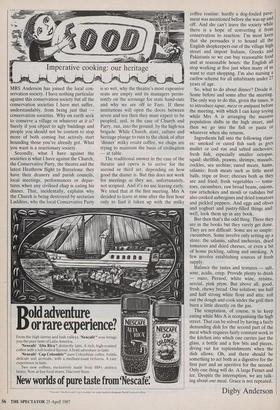a Imperative cooking: our heritage 1 MRS Anderson has joined
the local con- servation society. I have nothing particular against this conservation society but all the conservation societies I have met suffer, understandably, from being just that conservation societies. Why on earth seek to conserve ,a village or whatever as it is? Surely if you object to ugly buildings and people you should not be content to stop more of both coming but actively start hounding those you've already got. What you want is a reactionary society.
Secondly, what I have against the societies is what I have against the Church, the Conservative Party, the theatre and the latest Heathrow flight to Barcelona: they have their deanery and parish councils, local meetings, performances or depar- tures when any civilised chap is eating his dinner. That, incidentally, explains why the Church is being destroyed by sectarian Luddites, why the local Conservative Party is so wet, why the theatre's most expensive seats are empty and its managers persis- tently on the scrounge for state hand-outs and why we are off to Faro. If these institutions will open the doors between seven and ten then they must expect to be peopled, and, in the case of Church and Party, run, into the ground, by the high-tea brigade. While Church, state, culture and heritage plunge to ruin to the chink of after `dinner' milky ersatz coffee, we chaps are trying to maintain the basis of civilisation — at table.
The traditional answer in the case of the theatre and opera is to arrive for the second or third act, depending on how good the dinner is. But this does not work for meetings as they are, unfortunately, not scripted. And it's no use leaving early. We tried that at the first meeting. Mrs A decided to leave at nine after the first hour only to find it taken up with the milky coffee routine: hardly a dog-fouled pave- ment was mentioned before she was up and off. And she can't leave the society while there is a hope of converting it from conservation to reaction: I'm most keen that she persuades it to hound all the English shopkeepers out of the village high street and import Italians, Greeks and Pakistanis so we can buy reasonable food and at reasonable hours: the English all stop working at five just when many of us want to start shopping. I'm also nursing a curfew scheme for all inhabitants under 27 years of age. So, what to do about dinner? Divide it. Some before and some after the meeting. The only way to do this, given the times, is to introduce tapas, meze or antipasti before the meeting, with which I can keep toying while Mrs A is arranging the massive population shifts in the high street, and then we go into the fish or pasta or whatever when she returns.
Ingredients fall into the following class- es: smoked or cured fish such as grey mullet or cod roe and salted anchovies; fresh fish, especially smaller octopus, squid; shellfish, prawns, shrimps, mussels, cockles, sea urchins; cured meats, hams, salamis; fresh meats such as little meat balls, tripe or liver; cheeses both as they are and fried; fresh vegetables — toma- toes, cucumbers, raw broad beans, onions, raw artichokes and mouli or radishes but also cooked aubergines and dried tomatoes and pickled peppers. And eggs and olives and yoghurt and pastry-filled things and: well, look them up in any book.
But then that's the odd thing. There they are in the books but they rarely get done. They are not difficult. Some are so simple: cucumbers. Some involve only setting up a store: the salamis, salted anchovies, dried tomatoes and dried cheeses, or even a bit of home pickling, salting and smoking. A few involve establishing sources of fresh supply.
Balance the tastes and textures — salt, sour, acidic, crisp. Provide plenty to drink — ouzo, Pernod, white wine, retsina, sercial, pink plym. But above all, good, fresh, chewy bread. One solution: use half and half strong white flour and atta: roll out the dough and cook under the grill then burn a little directly on the gas.
The temptation, of course, is to keep eating while Mrs A is reorganising the high street. That can be solved by having a fairly demanding dish for the second part of the meal which requires fairly constant work in the kitchen into which one carries just the glass, a bottle and a few bits and pieces, diving out for replenishments when the dish allows. Oh, and there should be something to act both as a digestive for the first part and an aperitive for the second. Only one thing will do. A large Femet and ice. Despite the interruption, we are talk- ing about one meal. Grace is not repeated.
Digby Anderson


































































 Previous page
Previous page